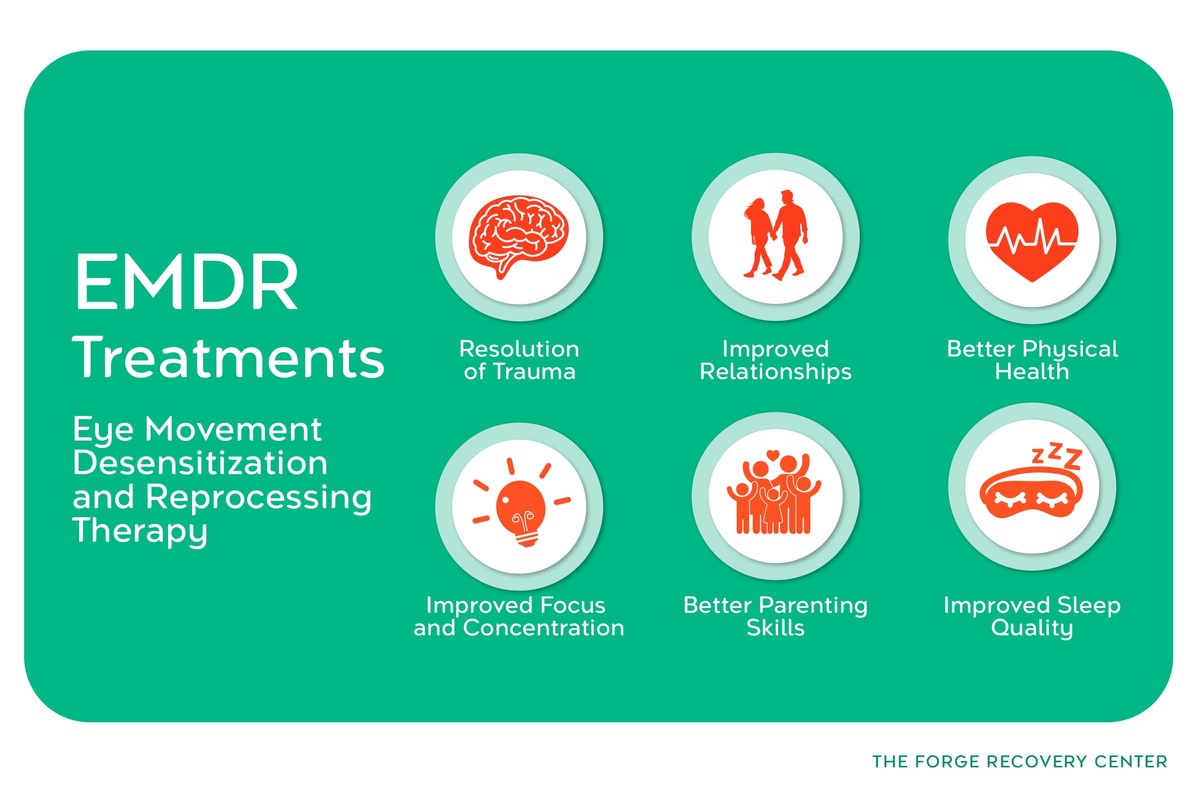EMDR Therapy: Treating Anxiety, PTSD, & Addiction


EMDR is a therapeutic approach commonly used to treat PTSD, along with anxiety disorders and substance addiction. It uses bilateral sensory input, like side-to-side eye movements, to help process traumatic memories and work through distressing events. Learn more about the uses and effectiveness of EMDR therapy — and if you need professional help processing past trauma, call The Forge Recovery Center today.
What Is EMDR Therapy?
EMDR therapy, or Eye Movement Desensitization and Reprocessing therapy, is a form of psychotherapy that helps individuals process traumatic memories and experiences. During EMDR sessions, the therapist guides the patient through bilateral stimulation, which can involve eye movements, taps, or sounds, while the individual focuses on the distressing memory.
This process helps to reprocess the traumatic event, allowing the person to integrate it in a less distressing way. EMDR has been found to be effective in treating conditions such as PTSD, anxiety disorders, phobias, and more.

What Does EMDR Treat?
EMDR is most commonly used to treat post-traumatic stress disorder (PTSD). Mental health professionals and treatment centers also use EMDR to treat anxiety disorders and substance abuse and addiction. Let’s explore the applications of EMDR further:
PTSD
When undergoing EMDR therapy for PTSD, you engage in bilateral stimulation, aiding the brain in processing traumatic memories. This approach helps reduce the intensity of traumatic experiences. The success rates of EMDR therapy in single-trauma victims are impressive, with noticeable improvements often seen after just a few sessions. Combat veterans also benefit significantly from this therapy, experiencing reduced symptoms and improved quality of life. Reputable organizations like the American Psychological Association and the World Health Organization recognize EMDR therapy as an effective treatment for trauma.
Anxiety Disorders
For individuals dealing with anxiety disorders, EMDR therapy offers a unique way to address their symptoms. By targeting distressing memories and negative beliefs, this therapy helps reprocess them, leading to decreased anxiety levels. The benefits of EMDR therapy in alleviating anxiety symptoms are remarkable, providing individuals with tools to manage their anxiety more effectively. Moreover, by delving into the root causes of anxiety disorders, EMDR therapy enables long-lasting relief and emotional healing.
Substance Abuse & Addiction
In treating substance abuse and addiction, EMDR therapy plays a crucial role in addressing underlying traumas that contribute to addictive behaviors. By focusing on past experiences that fuel substance abuse, this therapy aids individuals in breaking free from harmful patterns. The effectiveness of EMDR therapy in tackling trauma-related issues within substance abuse is evident through improved coping mechanisms and reduced cravings. It empowers individuals to confront their past traumas and develop healthier ways of managing stressors.

Are You Struggling with Mental Health or Addiction?
We Can Help. Call Us Now!
CALL: 877-839-1772
How Does EMDR Work?
EMDR therapy works by engaging both sides of the brain through bilateral stimulation, which helps process distressing memories. This is accomplished through an eight-stage process, starting with history-taking.
8 Stages of EMDR Therapy
History-Taking
History-taking in EMDR therapy is crucial as it provides insight into clients' past experiences and traumas. Understanding this background is essential for tailoring effective treatment plans. Therapists use history-taking to establish a foundation of trust and rapport with clients. This phase lays the groundwork for addressing specific traumatic memories during therapy sessions.
Preparation
Preparation in EMDR therapy involves ensuring that clients feel safe and ready to delve into their traumatic memories. It helps individuals feel empowered before starting the therapeutic process. By focusing on preparation, therapists can build a strong therapeutic alliance, fostering trust and openness between themselves and their clients.
Assessment
During the assessment phase, therapists identify specific targets for processing, such as distressing memories or negative beliefs. Assessments help tailor treatment plans to each client's unique needs. Thorough assessments are essential in EMDR therapy as they lay the groundwork for effective trauma processing, guiding the direction of the therapeutic journey.
Desensitization
The desensitization phase in EMDR therapy aims to reduce the emotional charge associated with traumatic memories. This process helps individuals process past traumas without feeling overwhelmed. Therapists utilize various techniques during desensitization, such as bilateral stimulation, to help clients reprocess distressing memories, leading to emotional healing.
Installation
In the installation phase, therapists work with clients to reinforce positive beliefs and emotions. This stage helps individuals integrate new, empowering beliefs about themselves post-therapy sessions. The installation plays a crucial role in promoting resilience and self-esteem by helping individuals replace negative thought patterns with more positive ones.
Body Scan
Body scans in EMDR therapy involve exploring how physical sensations are connected to emotional experiences. This process helps individuals develop awareness of how trauma manifests physically and emotionally. By engaging in body scans, clients can promote holistic healing by addressing both the emotional and physical aspects of their trauma experiences.
Closure
Closure in EMDR therapy assists clients in transitioning out of intense therapy sessions smoothly. It allows individuals to re-ground themselves after processing challenging emotions during sessions. Maintaining closure between sessions is vital as it helps individuals integrate their progress effectively and prepares them for ongoing healing outside of therapy sessions.
Reevaluation
Reevaluation in EMDR therapy involves tracking progress and adjusting treatment plans accordingly. It ensures that therapy remains effective by continuously assessing outcomes and adapting strategies as needed. Ongoing reevaluation throughout the therapeutic journey is critical for achieving long-term healing outcomes and addressing any emerging needs effectively.
EMDR Techniques & Scales
Treatment Techniques
In EMDR therapy, various techniques are utilized to help individuals process traumatic memories effectively. Bilateral stimulation, such as eye movements or taps, plays a crucial role in this therapy. This technique helps in reprocessing traumatic events by engaging both hemispheres of the brain simultaneously. The versatility of treatment techniques in EMDR allows therapists to tailor interventions based on individual client needs.
Measurement Scales
Measurement scales — particularly the EMDR Fidelity Rating Scale — are an essential component of EMDR therapy, providing quantitative data to track treatment progress accurately. These scales serve as objective tools for therapists to monitor changes in symptoms and overall well-being. By utilizing measurement scales, therapists can objectively assess the effectiveness of the therapy and make informed decisions regarding treatment adjustments.

Are You Struggling with Mental Health or Addiction?
We Can Help. Call Us Now!
CALL: 877-839-1772
Adaptive Processing & EMDR
What Is Adaptive Processing?
Adaptive processing, in the realm of EMDR therapy, refers to your brain's innate ability to heal itself. This natural mechanism allows you to process distressing memories and experiences effectively. By engaging in EMDR therapy, you can harness this adaptive processing power to reprocess traumatic memories. Through bilateral stimulation like eye movements or taps, your brain can navigate through these memories more smoothly.
Recognizing triggers is a crucial aspect of EMDR therapy. It involves identifying specific thoughts, emotions, or sensations linked to past traumas. By pinpointing these triggers, you can delve deeper into the root causes of your emotional distress. This process enables you to confront and address unresolved trauma effectively.
Identifying Triggers
Identifying triggers in EMDR therapy empowers you to understand the sources of your emotional struggles better. By recognizing what prompts negative reactions or intrusive thoughts, you gain insight into how past experiences continue to impact your present well-being. This awareness forms the foundation for addressing and resolving underlying trauma during therapy sessions.
Reprocessing steps in EMDR therapy involve several key stages aimed at desensitizing traumatic memories. By revisiting distressing experiences while focusing on bilateral stimulation, you facilitate the integration of new insights and perspectives. These reprocessing steps help you view past events from a different angle, leading to a shift in how you perceive and respond to those memories.
Reprocessing Steps
The transformative nature of reprocessing steps lies in their ability to create lasting changes in how you process traumatic memories. As you revisit these experiences under the guidance of a trained therapist, your brain actively works towards integrating new information and perspectives. This integration paves the way for emotional healing and resilience-building as you gradually release the emotional charge associated with past traumas.
EMDR Effectiveness
EMDR therapy has been found effective in treating various disorders. Here are some recent studies and statistics supporting its efficacy:
Research Studies
Several key research studies have demonstrated the effectiveness of EMDR therapy. One study found that EMDR may be slightly more effective than cognitive-behavioral therapy in treating PTSD. Another study in the Journal of Traumatic Stress highlighted EMDR's effectiveness in reducing symptoms related to trauma, finding that over 84% of single-trauma victims had recovered after three 90-minute EMDR sessions.
Studies have indicated significant improvements in individuals suffering from other mental health conditions as well, including anxiety disorders, phobias, and more, as well as substance use and addiction.
Statistics
EMDR therapy has gained recognition worldwide for its efficacy in treating trauma. The World Health Organization (WHO) recognizes EMDR as an effective method for addressing psychological trauma resulting from events like war, natural disasters, and interpersonal violence.
The impact of EMDR therapy on individuals' mental health is substantial. Studies have shown that EMDR not only reduces symptoms of PTSD but also improves overall well-being by enhancing emotional regulation, decreasing distress levels, and fostering resilience.
Are You Struggling with Mental Health or Addiction?
We Can Help. Call Us Now!
CALL: 877-839-1772
EMDR Questions & Concerns
Despite it being a non-invasive therapy, there are some concerns surrounding EMDR regarding its safety and effectiveness. Let’s address these concerns and the skepticism associated with EMDR therapy:
Common Concerns
When it comes to EMDR therapy, there are common concerns that may arise. Some individuals worry about the safety and effectiveness of this treatment. However, it's essential to understand that EMDR therapy is a well-established and evidence-based approach for treating trauma-related disorders.
One of the key clarifications to make is that EMDR therapy is not invasive and does not require you to talk in detail about your traumatic experiences. Instead, it focuses on processing these memories in a safe and controlled manner. The therapy follows a structured protocol that ensures your emotional well-being throughout the process.
Despite initial apprehensions, many individuals find EMDR therapy highly beneficial in addressing their trauma symptoms. By targeting distressing memories and reprocessing them with bilateral stimulation, such as eye movements or tapping, EMDR can help alleviate the emotional distress associated with past experiences.
Addressing Skepticism
If you encounter skepticism towards EMDR therapy, it's important to address it with factual information and real-life examples. Research studies have consistently shown the effectiveness of EMDR in reducing symptoms of PTSD and other trauma-related conditions.
By understanding how EMDR therapy works and its underlying mechanisms, you can better appreciate its potential benefits. The bilateral stimulation used in EMDR helps access and process traumatic memories stored in the brain, leading to desensitization and reintegration of these memories.
To counter skepticism effectively, sharing success stories from individuals who have benefited from EMDR therapy can be impactful. Hearing firsthand accounts of how EMDR has helped others overcome their trauma can provide reassurance and encouragement for those considering this treatment option.

Global Adoption of EMDR
EMDR has been adopted by hundreds of thousands of mental health professionals worldwide, being recognized by major organizations (WHO) as an effective treatment for PTSD and other conditions. Here’s a quick summary of its credibility and effectiveness:
Clinicians Worldwide
EMDR therapy has gained significant traction globally, with a growing number of clinicians incorporating it into their practice. Training and certification for EMDR therapists are crucial aspects that ensure the therapy is conducted effectively. The training process equips therapists with the necessary skills to address trauma and other mental health issues using EMDR.
Many mental health professionals worldwide have embraced EMDR due to its proven efficacy in treating various conditions. The impact of EMDR on clinicians has been profound, allowing them to provide more comprehensive care to their clients. The therapy's widespread adoption signifies a shift towards more evidence-based approaches in mental health treatment.
Positive Outcomes
Individuals who have undergone EMDR therapy often report remarkable improvements in their mental well-being. Personal accounts highlight how EMDR has helped individuals overcome past traumas and negative experiences. The therapy's ability to target specific memories and emotions enables individuals to process and resolve deep-rooted issues effectively.
The transformative effects of EMDR therapy extend beyond symptom relief, fostering long-term emotional resilience and psychological growth. Clients often experience a significant reduction in symptoms such as anxiety, depression, and PTSD after undergoing EMDR sessions. The therapy's emphasis on reprocessing traumatic memories leads to lasting changes in how individuals perceive and cope with distressing events.
Are You Struggling with Mental Health or Addiction?
We Can Help. Call Us Now!
CALL: 877-839-1772
Closing Thoughts
You've delved into the world of EMDR therapy, understanding its mechanisms, applications, and effectiveness. The power of EMDR lies in its ability to reprocess traumatic memories and promote healing in a structured yet adaptive way. By exploring the techniques, scales, and global adoption of EMDR, you've gained insight into its widespread recognition as a valuable therapeutic approach.
Now that you're equipped with knowledge about EMDR therapy, consider discussing it with a mental health professional to see if it could be beneficial for you or someone you know. Take the next step towards healing and growth by exploring how EMDR might offer a path to overcoming past traumas and fostering emotional resilience.
Are You Ready to Start EMDR Therapy?
EMDR therapy is an effective, non-invasive treatment that can help you healthily process trauma, manage anxiety, and overcome substance addiction. If you or a loved one are facing any of these struggles and need an ally on your healing journey, The Forge Recovery Center is here to help. Our team of mental health and treatment experts are thoroughly trained in EMDR therapy and techniques and will deliver a personalized therapeutic experience tailored to your unique needs and goals.
Call us today to learn more about how our EMDR therapy works and what to expect.



